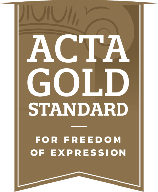
Campus Freedom Initiative™
Free expression is the necessary precondition for the unfettered search for truth on the college campus.
An ACTA Report Card on Free Expression
ACTA’s Campus Freedom Initiative™ (CFI) has evaluated universities in several states against our Gold Standard for Freedom of Expression™, a 20-point action plan for reestablishing higher education’s commitment to excellence and open inquiry. Below we present the Pennsylvania State University’s Gold Standard evaluation. Penn State receives credit for eight out of twenty Gold Standard measures. Our research highlights Penn State’s strengths in protecting free expression and identifies areas it must work on to improve the student experience. Explore the full Penn State Gold Standard evaluation to learn more.
 ACTA Gold Standard for Freedom of Expression™
ACTA Gold Standard for Freedom of Expression™| COMMIT TO A CULTURE OF FREE EXPRESSION | Penn State |
|---|---|
| Adopt the Chicago Principles on Freedom of Expression or a similarly strong statement. | No evidence of Penn State adopting the Chicago Principles or a similar statement could be found. The university’s statement on free speech and freedom of expression is insufficient to meet this measure. |
| Establish clear expectations regarding free expression in student and faculty handbooks and codes of conduct. | |
| Include a free expression unit in new-student orientations. | No materials showing Penn State meets this measure could be found. Requests to university officials for such materials remain unanswered. |
| Protect the diversity of political viewpoints by adopting an institutional neutrality policy such as the Kalven Report. | No evidence of Penn State adopting an institutional neutrality policy could be found. |
| FOSTER CIVIL DISCOURSE | Penn State |
| Sponsor campus debates that model civil discourse. | |
| Promote free expression by encouraging the establishment of student groups devoted to free expression, civil discourse, or representing a plurality of perspectives. | |
| Establish policies that protect free expression rights on campus and set clear consequences for disruption of sponsored speakers, events, and classes. | |
| Enforce policies that protect free expression rights on campus and apply clear consequences for disruption of sponsored speakers, events, and classes. | |
| Cultivate Intellectual Diversity | Penn State |
| Encourage presidents, provosts, and deans to model respect for a broad range of viewpoints. | |
| Guarantee that viewpoint diversity is reflected in student life policies and practices. | Evidence suggests that Penn State has not consistently applied its free expression policies across all political student organizations. This measure might change pending litigation. |
| Support academic centers dedicated to free inquiry and intellectual diversity. | No materials showing Penn State meets this measure could be found. |
| Ensure faculty hiring, evaluation, and promotion processes are based on merit and make clear that the institution is open to intellectual diversity. | There is no evidence of a university-wide effort at Penn State on these issues. |
| Break Down Barriers to Free Expression | Penn State |
| Eliminate speech and IT policies that have a chilling effect on free expression. | |
| Ensure that enforcement of Title VI, Title VII, and Title IX does not infringe on free expression. | Policies defining harassment contain elements likely to chill free expression. |
| Disband bias response teams. | Penn State tracks bias on its campuses and releases an annual report on this measure. |
| Review student government policies to ensure viewpoint neutrality in student group recognition and funding. | No clear statements prohibiting such discrimination could be found in our research. |
| Advance Leadership Accountability | Penn State |
| Include commitments to free expression in mission statements, values statements, strategic plans, and other key institutional documents. | |
| Include a commitment to free expression as a criterion in searches and evaluations for presidents, provosts, and deans. | No statement on free expression could be found in the available leadership search profiles. |
| Require free expression and viewpoint diversity training for administrative staff. | No materials showing Penn State meets this measure could be found. Requests to university officials for such materials remain unanswered. |
| Conduct regular surveys or other quantitative studies of students and faculty to assess the state of free expression and intellectual diversity on campus. | Penn State’s current campus climate survey does not meet this measure. |
ACTA and College Pulse’s survey, based on the responses of 2,032 undergraduate students collected during the summer of 2024, found alarming rates of self-censorship among Penn State students and widespread intolerance of opposing views. These survey results demonstrate that Penn State has serious free expression and viewpoint diversity deficiencies that it must address if it hopes to cultivate an environment that advances deep learning, innovative scholarship, and free discourse.
View Survey Results71
%of students have not spoken up on campus before because they thought their opinion would be unwelcome.
59
%of students believe professors who say something they find offensive should be reported to the administration.
86
%of students report receiving no training on free expression policies from staff or faculty.

Launched in 1995, we are the only organization that works with alumni, donors, trustees, and education leaders across the United States to support liberal arts education, uphold high academic standards, safeguard the free exchange of ideas on campus, and ensure that the next generation receives an intellectually rich, high-quality college education at an affordable price.
Discover MoreSign up to receive updates on the most pressing issues facing our college campuses.